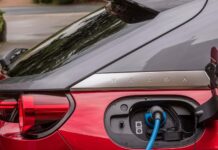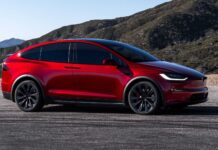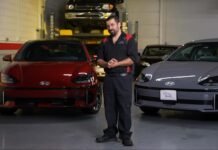[ad_1]
So, you’re considering making the switch to an electric car? Among the many reasons to consider an EV is this: EVs require significantly less maintenance than gas- or diesel-powered vehicles.
Fewer Parts
Battery Electric Vehicles (BEV) have fewer individual parts than conventionally powered vehicles. Generally, EVs can have 50 percent fewer parts, with industry comparisons showing typical EVs having 15,000 individual parts and conventionally powered vehicles having 30,000.
Of those parts, EV motors and transmissions have significantly fewer moving parts, always a maintenance concern. EVs may have as few as 20 moving parts to over 200 found in conventional automobiles. Modern engines and transmissions have never been more complex.

Maintenance To Forget
EVs don’t have engines, so you never have to change engine oil, check the radiator fluid, swap spark plugs, install new air filters, clean throttle body valves, or replace timing belts. Phew.
Also, most EVs don’t have multi-speed transmissions, so you never have to check the transmission fluid or their associated cooling systems.
Chances are you’ll frequent the repair shop less if you drive an EV.
Maintenance To Remember
EV fans might quip that, “EVs don’t need any maintenance.” While we appreciate their enthusiasm, that statement isn’t factual. EVs need to be properly maintained. Our team recommends that you follow your new vehicle’s maintenance guidelines, plus there’s variability between manufacturers, not to mention adjustments based on your driving style and environment.
Tire rotation and replacement: With oil changes falling from the to-do list, EV owners migh find themselves forgetting to rotate their vehicle’s tires. Tires don’t wear evenly front to back, so tire rotation is key to extending the tread life. It’s important to note that EVs tend to be heavier than conventionally powered vehicles, and this does cause more tire wear.
EVs typically use tires that are designed to provide low-rolling resistance (for greater range) and/or high performance. Many EVs also come standard with run-flat tires. As a result, replacement tires may be more expensive than what you’re used to. When replacing tires on an EV it’s also important to pay attention to whether the tires are “quiet.” Because EVs are quieter (no engine), tire noise is a significant issue for EV owners.
Because EVs utilize a feature called regenerative braking, the physical friction-based braking system (disc brakes at each wheel) typically last much longer than on a conventionally powered car. For more details on this, see our story Driving Your EV.
Because the friction braking system can get little use, some EV manufacturers recommend checking and lubricating brake calipers. Brake fluid will also need to be drained, flushed and replaced after several years.
Some maintenance items get “consumed” with use. Wiper blades, cabin filters and washer fluid fall into this category. Each still needs to be replaced at regular intervals. Air conditioning systems require their desiccant changed (a moisture absorbing material) after multiple years.
The fact that EV’s require so little maintenance is reflected in the reality that the hoods don’t even open on some EVs… like the Mercedes-Benz EQS 580 4Matic SUV. So how do you refill the windshield washer fluid? By a pop-out fill port on the driver-side front fender!
One area where EVs and conventionally-powered vehicles share identical needs is exterior and interior care and upkeep. Regular washing, waxing, vacuuming and cleaning keeps your vehicle looking good and you feeling good in it.
BEV vs. PHEV (Plug-in Hybrid Electric Vehicle)
PHEVs are another category of EV. PHEVs can be charged from an external source, plus they have a range-extending gas engine and transmission that works in tandem with a modestly sized battery pack and motor that’s smaller than a BEV.
Since PHEVs have engines and transmissions, they do require more maintenance than a BEV, including engine oil changes, engine air filters, etc. However, because PHEVs engines run less than a conventionally-powered vehicle, powertrain maintenance requirements are less frequent.
More On EVs
To learn more about EVs in articles written for everybody, check out our library of EV 101 stories:
[ad_2]
Source link
















